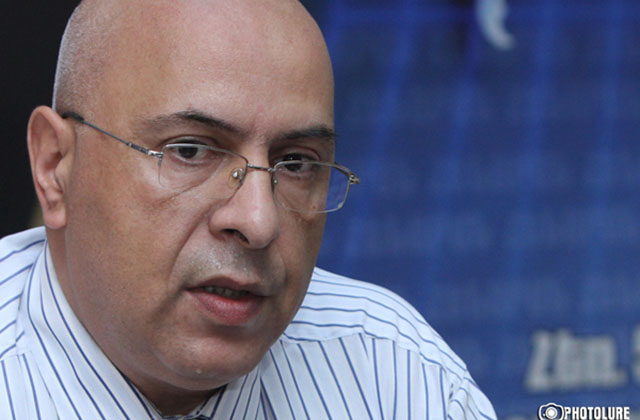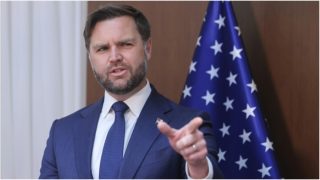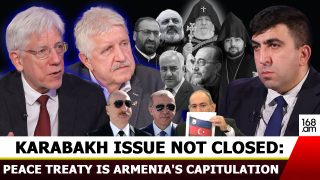
“If a small country like Armenia won’t be able to overcome international isolation, development is impossible”

Interview with Ashot Yeghiazaryan, Doctor in Economics.
Mr. Yeghiazaryan, what does the Government’s action plan promise? What issues does it solve and is it possible to provide positive results in such a short period—until Parliamentary elections?
Government’s action plan doesn’t solve challenges, which our country faces. Armenia really appeared in isolation, and if we don’t come out, no issue will be solved. Thus, situation improvement can’t be recorded, negative tendencies will proceed. The liabilities we have as a EEU member country have restricted our chances, and this action plan states that there are no steps, which will provide the opportunity to come out of this isolation, in particular, relations with Iran have been repeatedly touched upon. The action plan has a provision, that friendly ties should be existent with Iran and Georgia. What other relations should have been observed? Nothing more in case, when one of the ways to overcome this isolation is establishment of Iran-Armenia-Georgia corridor and economic zone, available initiatives, and the Iranian side constantly sets forward the issue of implementing them.
Meanwhile, there is not a single word about it. Even if there was a mention of epochal Iran-Armenia railway in former Government’s action plan, despite its being implementable under EEU, even the mention of it lacks in this action plan. Finally, we should clearly define—do we sign the framework agreement with the EU or not?
Signal to investors, respective assistance by the EU and etc. also depends on this. If presently these conditions aren’t provided, it’s not clear and it’s impossible to anticipate any development, growth, investments. Numerous points may be enumerated in different fields, for instance, transport, energy and etc. Basically, all the fields, enshrined in the document, their provisions or approaches aren’t revelations, as those departments have those approaches and provisions in their strategies, and currently a part of them is being selectively outspoken, and it’s rather encouraging, is included in this action plan, however, in fact, they are strategies of those departments, and there is nothing new in this regard.
On the whole, we may say that the action plan doesn’t comply with new geopolitical realities. I mean what processes are ongoing in the region—the EU, the USA, Iran, increase of their influence, new regional initiatives, projects, and intensification of sanctions against Russia, isolation policy on the other hand. If we should remain within the scope of Russia’s influence and not attempt to undertake respective steps conforming to new realities, isolation will deepen, any positive expectations can’t come in that sense, i.e. the action plan is cut from the reality. If anyone says that this is more realistic, i.e. steps to be taken are enshrined, it’s an illusion.
Which is realistic, when developments are taking around us, to which we don’t adequately reflect? What may be anticipated under these conditions? Familiar slogans, provisions, which in many cases are responsibilities as well, which Armenia has assumed, e.g. reforms in management of state finances, cooperation with the EU, which refers to government purchases and etc. These are common provisions. If we reflect to those geopolitical realities, it’s stated, “allied relations with Russia,” however, in that case what does “ally” or “alliance member” mean? Members of that very alliance are Belarus and Kazakhstan. Why isn’t it stated that they are also the so-called “allies.” It’s not clear. The USA is becoming a “friendly partner” or it’s declaratively stated: “separate relations” with EU member countries. Which countries are meant? There are EU members, which provide assistance to Armenia until this day in the field of energy, provisions of which aren’t reflected in this action plan. There is no mention of it, i.e. likewise action plan can’t contribute to overcoming Armenia’s international isolation.
And if a small country like Armenia won’t be able to come out of international isolation, development is impossible. Let me make the following comparison: in the former action plan of 2014, at least on a macro level an issue was set, which I don’t so support, that it’s possible to solve the issue that way, however, it was stated—solving issues on the basis of internal resources. In this action plan even this lacks, i.e. discussion on a macro level, moreover, on international economic relations level, totally lacks.
Stresses are mainly institutional; development of a concept, legislative initiatives and likewise provisions. Moreover, the fact that the situation is hard, and in this sense—desperate, edified the point that a research strategic center will be established, i.e. our hope is becoming that strategic center, which should offer approaches. It’s not clear what kind of approaches it would offer.
Can those gaps be conditioned by its being short-term?
I don’t think so. In any case, what does short-term mean? Don’t we need to overcome that isolation? Does this mean that those issues should be set then? Firstly, there are numerous issues in the agenda. The framework agreement is included in it, let them clarify that issue as well. Iran made a proposal on establishing Iran-Armenia-Georgia-Black Sea-Bulgaria-Greece transport corridor. There is no reply. Is it possible to set forward the issue of signing a free trade agreement with Iran in a short-term perspective? Iran has stated this since 2010. That short term may cost us dear.
There were talks and opinions, that Karen Karapetyan has the issue of preventing Russophobia in Armenia and increasing Russian influence. Can conclusion be drawn from this action plan that Armenia will be more involved in Russia’s contour?
I do my analysis based on concrete facts, in this case, not based on talks. They may be a bit exaggerated, and this is an issue as well. In this case the reality is that we aren’t able to work freely within this action plan, and now it’s more stressed. In the previous one at least Iran’s provision could be found, which although wasn’t practicable under those conditions, as in that period there was isolation as well, however, it’s deeper now.
In his speech at the NA Karen Karapetyan made a proposal, that e.g. exporters may be provided loans in Russian ruble. Isn’t it an edifice to “Russification”?
It may be observed from that perspective as well, i.e. complex of that dependency, basically, is put like an axiom. That’s why I say that the action plan isn’t equivalent.
By Gayane Khachatryan

























